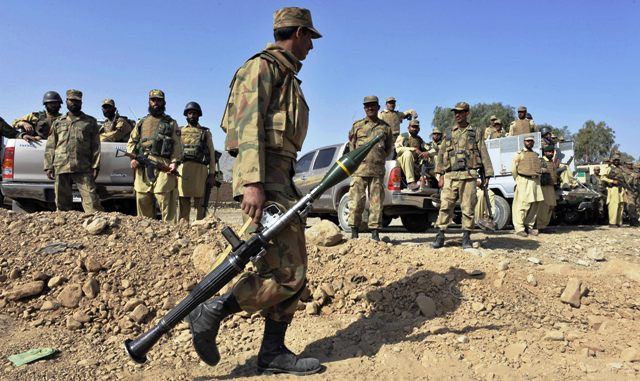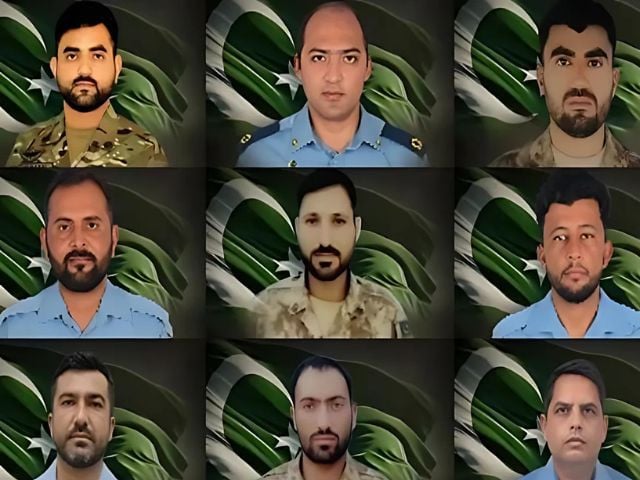40 civilians, 11 troops martyred in Indian aggression: ISPR
Military releases the names of the fallen personnel, who included air force and ground unit members

At least 51 people, including 40 civilians and 11 military personnel, were martyred during India's cross-border attacks on Azad Jammu and Kashmir and Pakistani territory, Pakistan’s military said, calling the attacks “unprovoked and reprehensible”.
The casualties occurred during a military escalation on the night of May 6 and 7 during which Indian forces deliberately targeted residential areas, including women, children, and the elderly, the Inter-Services Public Relations (ISPR) said on Tuesday.
“These barbaric strikes resulted in the martyrdom of 40 civilians — among them 7 women and 15 children,” the ISPR said. At least 121 others were injured, including 10 women and 27 children.
The ISPR said 11 personnel of the Pakistan armed forces were also killed in action while defending the region. Seventy-eight others were wounded.
“The armed forces mounted a resolute response... delivering precise and measured retaliation,” the statement added.

The military released the names of the fallen personnel, who included air force and ground unit members:
Naik Abdul Rehman, Lance Naik Dilawar Khan, Lance Naik Ikramullah, Naik Waqar Khalid, Sepoy Muhammad Adeel Akbar, Sepoy Nisar, Squadron Leader Usman Yousuf, Chief Technician Aurangzeb, Senior Technician Najeeb, Corporal Technician Farooq, and Senior Technician Mubashir.
“Their noble sacrifice is an enduring symbol of courage, devotion, and unwavering patriotism — etched forever in the nation’s memory,” ISPR said.
The statement continued, “The armed forces, together with the people of Pakistan, pay solemn tribute to the martyred civilians and military personnel, and offer heartfelt prayers for the swift recovery of the injured.”
It concluded with a warning, stating that any attempt to challenge Pakistan’s sovereignty “shall be met with a swift, full-spectrum, and decisive response, Inshallah.”
Earlier on Monday, senior military officials from Pakistan and India held their first round of talks through a hotline and agreed to maintain the ceasefire agreed on Saturday after the five-day war.
As part of the ceasefire deal, brokered by the United States, Director General Military Operations (DGMO) of Pakistan Major General Kashif Abdullah and his Indian counterpart Lt Gen Rajiv Ghai spoke to each other.
India-Pakistan ceasefire follows escalation, but fragile calm persists
A full and immediate ceasefire between India and Pakistan was announced on May 10 after days of heightened military exchanges that brought both nuclear-armed neighbours to the brink of war.
The announcement was first made by US President Donald Trump and later confirmed by Pakistan’s Prime Minister Shehbaz Sharif, Deputy Prime Minister Ishaq Dar, Indian External Affairs Minister S. Jaishankar, and US Secretary of State Marco Rubio.
Tensions flared following an April 22 attack in Pahalgam, Indian Illegally Occupied Jammu and Kashmir (IIOJK), which left 26 civilians dead.
India blamed Pakistan-based elements without presenting any evidence, Islamabad rejected the allegations. In response, India closed the Wagah border, revoked visas, and suspended the Indus Waters Treaty—moves Pakistan called an “act of war.”
The conflict intensified with India's missile attracks and drone incursions as it lauched its Operation Sindoor.
Pakistan's military launched Operation Bunyan-un-Marsoos in retaliation, and announced it had downed five Indian jets—including Rafales—and intercepted 77 Israeli-made Harop drones.
Following diplomatic intervention led by Washington, both sides agreed to halt military activity across land, air, and sea. However, hours after the truce, fresh skirmishes were reported along both sides of the Line of Control.
Explosions were heard in Srinagar and exchanges of fire were cited by officials on both sides, raising concerns over the ceasefire’s durability.
Pakistan’s Foreign Office reiterated its commitment to the ceasefire while accusing India of violations.
DG ISPR Lt Gen Ahmed Sharif Chaudhry stressed that Pakistan had not requested the truce, asserting that India initiated the ceasefire request following Pakistan’s retaliatory strikes. He described war between two nuclear powers as “inconceivable” and “an absurdity.”
Chaudhry confirmed that no Indian pilot was in Pakistani custody, dismissing viral claims as misinformation.
He called Operation Bunyan-un-Marsoos a unified national response to Indian aggression, noting Pakistan had delivered on its commitments to respond decisively and proportionately.
Cities across Pakistan observed Youm-e-Tashakkur (Day of Thanks) on Sunday to mark what was hailed domestically as a successful defence of national sovereignty.
























COMMENTS (1)
Comments are moderated and generally will be posted if they are on-topic and not abusive.
For more information, please see our Comments FAQ